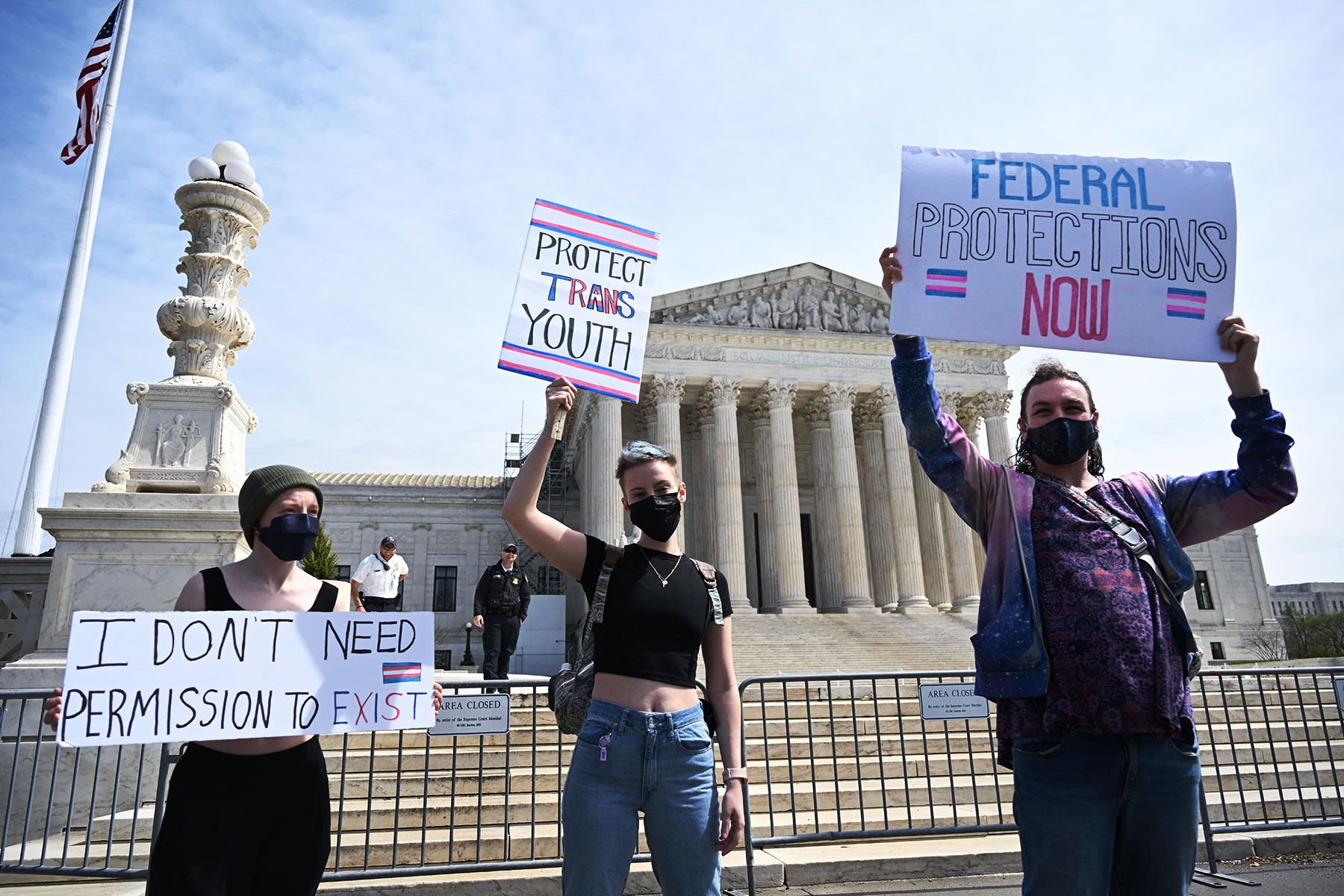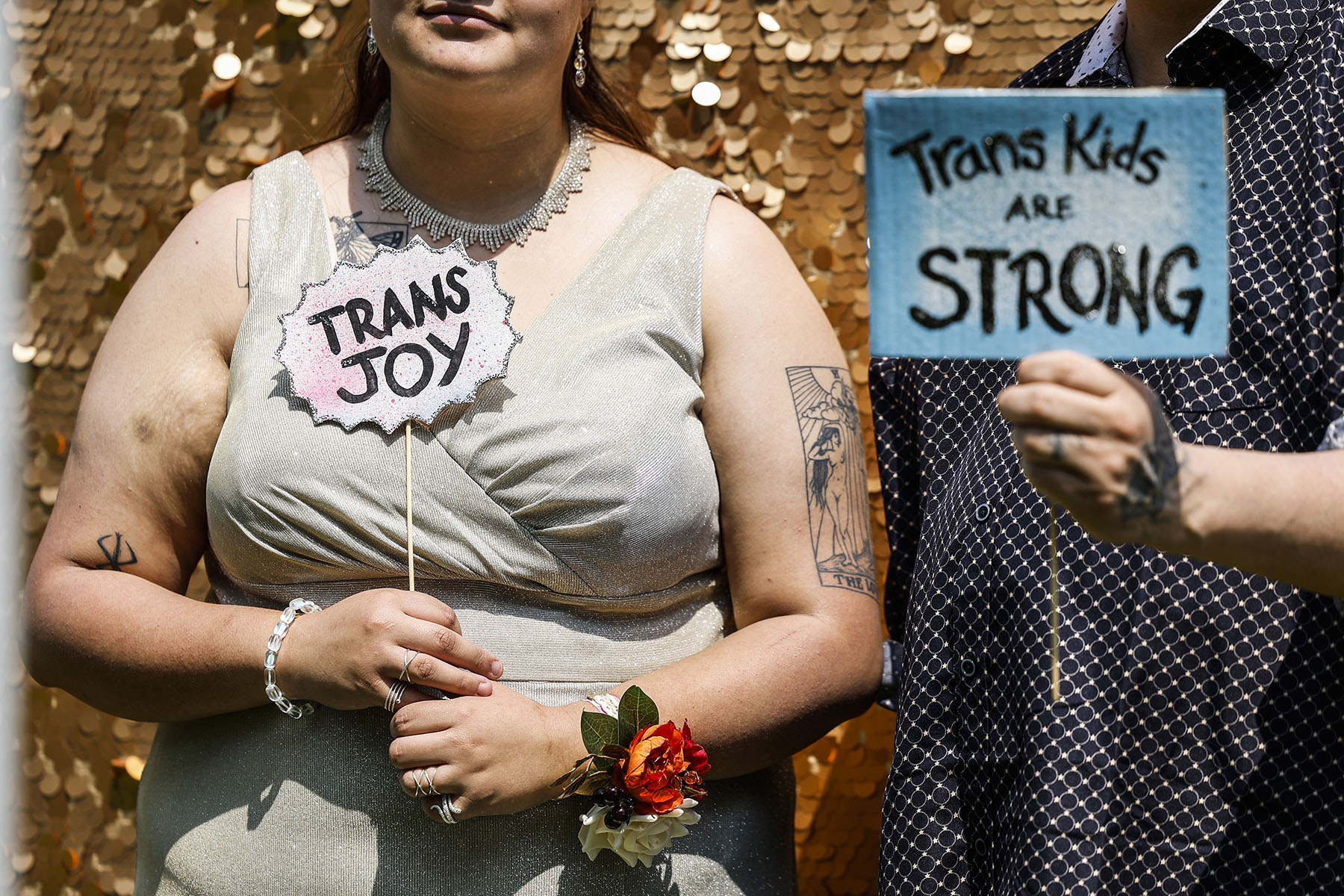This Disability Pride Month, we’re telling the untold stories of women, women of color and LGBTQ+ people. Sign up for our daily newsletter.
For nearly six months, Kesha Williams was housed with men in a Virginia prison. Williams, a transgender woman, was denied access to her hormone medication, misgendered and harassed by prison deputies, according to a lawsuit she filed against the county sheriff and detention center staff.
Her ongoing legal fight has created historic precedent: People with gender dysphoria are protected under the Americans with Disabilities Act (ADA). The U.S. Supreme Court recently allowed that precedent, first upheld by the U.S. Court of Appeals for the 4th Circuit, to stand. Advocates view that as a hopeful sign in the years-long battle to include trans people in federal disability law.
Lawyers and advocates have worked to secure legal acknowledgement of transgender people within the ADA for decades. Bias against trans people was baked-in to the ADA at the time of its passage, said Jennifer Levi, the senior director of transgender and queer rights at GLBTQ Legal Advocates & Defenders.
The ADA excludes disability protections for people with “gender identity disorder” in the same paragraph that it excludes pedophilia and compulsive gambling. When explaining why this exclusion should no longer bar trans people from being protected by the law, legal experts point out that gender identity disorder has not been recognized as a medical condition since 2013.
However, gender dysphoria — distress experienced by many, but not all, trans people due to their body not aligning with their gender — is a recognized medical condition. It replaced gender identity disorder in the fifth edition of the Diagnostic and Statistical Manual of Mental Disorders in order to lessen stigma and emphasize that being transgender is not a mental disorder.
The ADA prohibits public entities from discriminating against people with disabilities by excluding them from services and programs. In the ADA, disability is discussed as something that keeps people from being able to work or participate in society, Levi said — not because someone is inherently limited, but because they face barriers created by social expectations. For example, the ADA required changes to architecture standards to create accessible buildings and designs that support different kinds of mobility.
Gender dysphoria keeps people from thriving and participating in society because of the distress and stigma the medical condition causes, and by public institutions not accommodating their needs or providing the gender-affirming care that they need, Levi said.
The ADA defines a disability as “a physical or mental impairment that substantially limits one or more major life activities of the individual.” As noted by the 4th Circuit, even the sheriff named as a defendant in Williams’ lawsuit does not dispute that gender dysphoria falls within this definition of a disability. The sheriff instead argues that the ADA’s exclusion of “gender identity disorders not resulting from physical impairments” makes William’s case moot.
But, as the 4th Circuit notes, the ADA must be interpreted as Congress directed in 2008 — as broadly as possible. The court also notes that “nothing in the ADA, then or now,” indicates that gender dysphoria and gender identity disorder can be considered the same condition.
In her lawsuit, Williams argues that gender dysphoria is a physical phenomenon that cannot be excluded from the protection of federal disability law. The court agrees that Williams has made a sufficient case that her gender dysphoria “result[s] from physical impairments” — and that her need for gender-affirming care to alleviate that distress supports that idea.
“There’s no reason why transgender people can’t and shouldn’t be included,” Levi said. The ADA is “perfectly situated to ensure that transgender people aren’t kept from being included in a whole range of different areas because of the stigma associated with the medical condition that people experience, which is gender dysphoria.”

Levi has been making this argument for a long time: In 2002, she made the first successful legal argument that a trans client should be covered under disability discrimination law in Massachusetts.
The Supreme Court’s denial to take up Williams’ case could mean that it agrees with the 4th Circuit, or simply that it is not interested in taking up the issue of whether trans people are covered under disability law right now, according to legal experts. Notably, there has not been a split in opinion on this issue among two or more circuit courts, which is a typical incentive for the Supreme Court to get involved.
In the last few years, the high court has declined to take up challenges to several cases that reinforced protections for transgender people facing discrimination. This trend followed the 2020 ruling in Bostock v. Clayton County, in which the Supreme Court found gender identity to be a protected class of sex. This is possibly because they are abiding by Bostock’s findings that trans people are protected by existing federal laws, said Ezra Ishmael Young, a civil rights lawyer and scholar.
“I think that is good news. I think it signals some confidence to the lower courts that they’re doing a good job with how they’re navigating these various issues,” he said.
In October 2020, the Supreme Court declined to review a case in which the Idaho Department of Corrections was ordered to provide gender-affirming surgery to a transgender woman. Earlier this year, the high court refused to reinstate the West Virginia ban on transgender students playing school sports that match their gender identity. The Supreme Court also handed a win to Gavin Grimm by declining to hear a Virginia school board’s challenge against allowing trans students to use bathrooms that match their gender identity. It also declined to hear a challenge to a California court decision over a trans patient who was denied hospital care for being transgender.
Although these cases deal with distinct areas of law, they are linked by a common thread: whether transgender people get the same rights as others, Young said.
Two justices dissented from the decision not to review Williams’ case: Supreme Court Justice Samuel Alito and Justice Clarence Thomas. In that dissent, Alito urges his colleagues to see the question of whether trans people should be covered under disability law as one of “great national importance,” since in his view, it would have “far-reaching and highly controversial effects.”
“He is deeply worried of what a world looks like in which we recognize the rights of transgender Americans, as they already exist under very old federal laws,” Young said.
The high court declining to get involved in Williams’ case is a blessing, as it has been in other disability law cases, said Doron Dorfman.
Dorfman, associate professor at Seton Hall Law School who specializes in disability and health law, pointed to a case two years ago that the Supreme Court declined to review involving a website’s accessibility for blind people. By not getting involved, the high court affirmed a lower court’s ruling and avoided a potentially hostile ruling for disabled people.
“The Supreme Court denied cert, and everybody was relieved. Because the disability community thought, ‘We don’t want the current makeup of the Supreme Court deciding disability cases right now,’” Dorfman said.
That 4th Circuit decision in Williams’ favor gave trans people living with gender dysphoria in Maryland, Virginia, West Virginia, North Carolina and South Carolina a powerful protective tool through federal disability law. However, a recent case in the U.S. District Court for the District of Colorado shows how this precedent is being endorsed in other states.
Colorado, which falls under the 10th Circuit, has no obligation to adopt precedent set by an outside circuit court. However, a federal judge in the case of Griffith v. El Paso County, Colorado — another case involving an incarcerated transgender woman suing a prison for discrimination — agreed with the 4th Circuit that gender dysphoria is protected by the Americans with Disabilities Act.
“The court is likewise convinced that gender dysphoria is a disability included in the ADA protections, and then he cites Williams, which is a big deal,” Dorfman said.
However, the judge’s analysis shows that, even if a court accepts this precedent, it doesn’t guarantee that a case will be won. In her lawsuit, Darlene Griffith recounts being assaulted by male inmates and harassed by guards at the county jail, and being denied women’s clothing and female housing. As part of her suit, she accuses El Paso County of disability discrimination against her under the ADA. Those claims, alongside the others in her lawsuit, were dismissed, though Griffith is appealing. The El Paso County Sheriff’s Office declined to comment on the case.
Notably, the court believes that discrimination based on gender dysphoria violates the ADA and Rehabilitation Act, which prohibits employment discrimination due to a disability. The magistrate judge in the case also finds that Griffith’s gender identity is relevant to needing a reasonable accommodation.
However, since ADA protections for those with gender dysphoria “is not remotely settled law,” the court ultimately found that Griffith cannot accuse the jail of being “deliberately indifferent” to her disability, or of knowing that it was substantially likely that it was harming her federally protected right. The court also took into account that Griffith had since been moved into a female jail facility.
In essence, the court said that it wasn’t clear if the prison knew that it needed to accommodate Griffith for her gender dysphoria.
Kevin Barry, associate dean and law professor at Quinnipiac University School of Law, said that the court endorsing gender dysphoria as protected under the ADA — even if it didn’t help Griffith’s case — is important because it underlines that trans people have the right to seek refuge under that law.
“The reason it’s important is because … if we’re to say that gender dysphoria is excluded, they never get their day in court,” he said.
Barry expects to see more cases addressing the protection of trans people under federal disability law, and to see more courts revisiting previous decisions.
“These cases have a way of mushrooming,” Barry said.
In Zayre-Brown v. The North Carolina Department of Public Safety, a federal judge wrote last September that, due to the 4th Circuit’s unequivocal ruling, “a plaintiff can state a claim for disability discrimination for gender dysphoria as a matter of law.”
In the meantime, Williams’ case is headed back to district court. The Fairfax County Sheriff’s Office in Virginia, which oversees the detention center that Williams was held in, declined to comment “on particulars of any rulings or nuanced facts” surrounding the Supreme Court declining to review the 4th Circuit opinion in Williams’ favor.
Williams’ lawyer, employment and civil rights attorney Joshua Erlich, said that Williams “couldn’t be happier” about the outcome of the case so far. She’s eager to get back into court.







